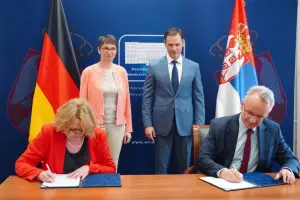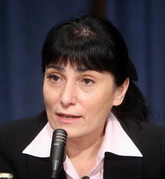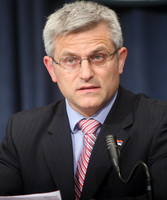- Serbia
Get to know Serbia
- Citizens
Culture and science
Health services
Pension and disability insurance
- Business
Employment
Economy
- Media
- Government
- Contact
Keep in touch
Contact form
Back
Keepin touch
Whether you have a question, comment, suggestion or any problem in the purview of the government, send us your message and we will try to respond as soon as possible. If your problem is not in our purview, we will forward your message to the relevant institution.
Q:
A:
Government, IMF agree on €3b arrangement
Belgrade,
26 March 2009
Minister of Finance Diana Dragutinovic today stated that the Serbian government and the IMF agreed on a stand-by arrangement worth €3 billion which will be implemented by April 2011.
At a press conference held at the government building, Dragutinovic said that Serbia will have to cover the budget deficit of RSD 100 billion in order to have the stand-by arrangement implemented.
She explained that the new arrangement will replace the previous one from January 2009, which envisaged the withdrawal of €402.5 million.
The Minister noted that by revising the state budget the government will adapt its policy to the global financial crisis.
According to Dragutinovic, the government is planning budget savings worth RSD 60 billion and an increase of RSD 40 billion in tax revenues.
She said that the government will also freeze salaries and pensions and therefore keep them at the same level as 2008.
She explained that the new arrangement will replace the previous one from January 2009, which envisaged the withdrawal of €402.5 million.
The Minister noted that by revising the state budget the government will adapt its policy to the global financial crisis.
According to Dragutinovic, the government is planning budget savings worth RSD 60 billion and an increase of RSD 40 billion in tax revenues.
She said that the government will also freeze salaries and pensions and therefore keep them at the same level as 2008.
The Governor of the National Bank of Serbia Radovan Jelasic stated that the new arrangement with the IMF will lead to a severe decrease in public expenditure and the largest synchronization of the state budget since the beginning of transition.
He pointed out that Serbia would not be able to cover its budget deficit nor pay out pensions and salaries without IMF assistance.
Jelasic said that the first part of the loan, to the amount of €3 billion, should be drawn in mid-May, adding that €2.2 billion should be used by the end of this year, while the rest is planned for 2010.
The Governor said that inflation should be around 10% while state-controlled prices should not increase by more than 15%.
He pointed out that Serbia would not be able to cover its budget deficit nor pay out pensions and salaries without IMF assistance.
Jelasic said that the first part of the loan, to the amount of €3 billion, should be drawn in mid-May, adding that €2.2 billion should be used by the end of this year, while the rest is planned for 2010.
The Governor said that inflation should be around 10% while state-controlled prices should not increase by more than 15%.
Chief of the IMF mission Albert Jaeger said that Serbia’s GDP will certainly fall in 2009, adding that he expects in 2010 it will be zero.
He said that as a consequence budget revenues are not at the planned level so that there will be a large hole in the budget and because of a halt in the influx of foreign capital there will also be losses in foreign financing.
Jaeger explained that because of this Serbia must prepare a set of fiscal adaptation measures in order to limit the budget deficit to 3% of GDP, which is the maximum level that can be financed from non-inflationary sources, adding that requests have been made to foreign banks to give guarantees that the existing level of credit exposure in Serbia will be maintained and that those banks will maintain the capitalization level for affiliated banks in Serbia.
He said that despite significant help by the IMF, the Serbian government will seek additional support from other international financial institutions and donors, recalling that the revised and extended arrangement must be approved by the executive and managing boards of the IMF.
He said that as a consequence budget revenues are not at the planned level so that there will be a large hole in the budget and because of a halt in the influx of foreign capital there will also be losses in foreign financing.
Jaeger explained that because of this Serbia must prepare a set of fiscal adaptation measures in order to limit the budget deficit to 3% of GDP, which is the maximum level that can be financed from non-inflationary sources, adding that requests have been made to foreign banks to give guarantees that the existing level of credit exposure in Serbia will be maintained and that those banks will maintain the capitalization level for affiliated banks in Serbia.
He said that despite significant help by the IMF, the Serbian government will seek additional support from other international financial institutions and donors, recalling that the revised and extended arrangement must be approved by the executive and managing boards of the IMF.
-
 Belgrade, 11 August 2025
Belgrade, 11 August 2025Support for agricultural projects worth RSD 750 million
-
 Belgrade, 21 July 2025
Belgrade, 21 July 2025Construction of oil pipeline with Hungary to begin early next year
-
 Belgrade/Athens, 17 July 2025
Belgrade/Athens, 17 July 2025Serbia continues to align with EU in field of energy
-
 Kostolac, 14 July 2025
Kostolac, 14 July 2025First solar power plant Petka in Kostolac put into trial operation
-
 Belgrade, 11 July 2025
Belgrade, 11 July 2025Potential for improving cooperation with Belarus in many areas
-
 Požega, 5 July 2025
Požega, 5 July 2025Section of Pakovraće - Požega highway officially opened
-
 Belgrade, 2 July 2025
Belgrade, 2 July 2025Technical specifications defined for Serbia-Hungary oil pipeline
-
 Belgrade, 30 June 2025
Belgrade, 30 June 2025IMF confirms Serbia successfully implementing all agreed reforms
-
 Belgrade, 27 June 2025
Belgrade, 27 June 2025Double Taxation Avoidance Agreement with Germany signed
-
 Kostolac, 25 June 2025
Kostolac, 25 June 2025Construction of Kostolac wind farm nearing completion



